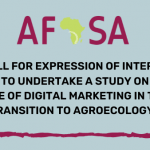We, more than 400 people, in our capacity as members and supporters of the West African Peasants Seed Committee (WACS), represented by farmers (men, women and youth), farmers’ organisations, development NGOs, women’s groups, youth groups and research institutes from Benin, Burkina Faso, Chad, Côte d’Ivoire, Gambia, Ghana, Guinea, Guinea Bissau, Liberia, Mali, Mauritania, Niger, Senegal and Sierra Leone, meeting from 15 to 17 March 2022 on the occasion of the 7th edition of the West African Peasants’ Seed Fair in Djimini, Senegal, have issued the attached Declaration in support of continental advocacy for a new paradigm on seed governance and policies.
In a context where rules and norms all over the world limit the food sovereignty of populations, the respect of the right to life and the right to food is consequently impinged upon by international cooperation. A decisive step has been taken by a damaging ecological transition characterised by the stranglehold of agribusiness on the food production chain. Incentives are being promoted for the approval of genetically modified plants and animals in agriculture: biotechnology is in our bowls. However, the genetic editing of seeds requires the use of related pesticides. A system is thus created for and by the agricultural industries in the vicious circle of the fusion of GMOs, pesticides and synthetic chemical fertilizers.
In the 21ste century, the all-chemical seed industry has led to the sterility of arable land, leaving farmers in a precarious situation. Added to this is the supply of new and expensive inputs for the production of seeds protected by intellectual property, which deprives farmers of their freedom as producers. However, with its back to the wall, the productivist logic of the use of synthetic fertilisers and GMOs has only led to soil exhaustion, coupled with a lack of diversity, disruption of ecosystems and loss of biodiversity.
In biology, nature rejects any chimerical construction that does not come from the engineering of its ecological universe. Farmers’ seed systems (FSS), however, embrace the mechanisms that underpin the balance of the ecosystem and preserve the unique renewable biomass that is agriculture and its virtues. More concerned with its financial health, the agricultural industry is annihilating the impact of the nutritional depletion of its genetic products on human health, which has never been so aggressively affected by the catastrophic development of chronic pathologies known as civilisation. In the light of the poisoning of the soil and of our organisms at the same time, we have no choice but to safeguard Natural Agriculture by refusing any food emptied of its nutrients.
Therefore, by virtue of the above :
- Given the lack of any scientific basis for relegating farmers’ seeds to the status of unproductive seeds of the archaic past,
- Taking into account the little interest that our States give to the potential of PHC in the curriculum of agricultural training schools, which are more oriented towards uncontrolled, imported and random solutions,
- Noting the continued promotion of hybrid seeds, so-called high-yielding varieties, in conjunction with the deliberate collapse of agricultural biodiversity and land through the increasingly concentrated doses of synthetic chemical inputs dumped on the soil,
- Taking note of the harmful effects camouflaged under the charm of a green revolution of increased productivity of cultivated land, but whose other side of the productivist coin is, in the long term, the loss of all agricultural yield,
- Measuring the impact of soil decay through the insertion of synthetic chemical pollutants that cause endocrine disruptors that are detrimental to the human genome and our quality of life,
- Paying particular attention to the continental movement to fight back against the diktat of certified seeds and their pesticides, which are also costly for vulnerable producers,
- Recognising that farmers remain the primary actors of our health, guaranteed by their know-how and the nutritional quality of their seeds for our well-being,
- Taking into account the humanising impact of the ecological education inherent in the practices of the peasant seed system of Healthy Agriculture,
- Gauging the fair civilisation value of farmer seed systems whose wide range of seeds and natural means still prove their worth in reviving soils, fighting pests, increasing the nutritional value of crops with a high level of productivity,
- Witnessing the parallelism of policy-making poles where the state delegates its agricultural sovereignty to the supranational agenda of the seed industry cartels, whose only concern is to get richer
- Considering the international climate policy of the New Green Agenda which is not concerned with any environmental policy and de facto ignores the crucial and central issue of the quality of productive land which is the granary of human survival,
- Considering the negative and dangerous repercussions of artificial seed manipulation and transformation,
We make the following recommendations to the sub-regional and African institutions (AU, ECOWAS, UEMOA and CILSS)
- Adopt and implement a regulatory framework that promotes farmers’ seed systems in the national patrimony of the States’ genetic resources, in order to protect them against any form of patentability by third parties to the detriment of farmers’ communities: the regulatory framework developed by the Alliance for Food Security in Africa (AFSA) could serve as a basis for each member country of CILSS, UEMOA and ECOWAS
- Halt the current free trade treaties that establish and privilege the use of seeds released using CRISPR technology, which was classified in 2016 by genome editing research as a weapon of mass destruction,
- Prohibit the use of all synthetic chemical inputs given their reprotoxic and genotoxic danger for the human species and in particular on intra-uterine development,
- Include the value chain of farmers’ exchange networks in the retrospective mapping and description of endogenous seed systems as a duty of sovereign agricultural development,
- Prioritise the eco-systemic protection of food crops over industrial ones in the light of cross-border digital documentation of local experiences in the valorisation of farmers’ seed systems,
- Applying economic protectionism, with solidarity, to local barter and/or marketing markets for the products of peasant seed systems,
- Involve farmers’ organisations in agricultural policy-making bodies as representative stakeholders in the future-oriented process that is crucial for safeguarding the values of producer-oriented agriculture,
- Maintain the digital visibility of a satellite account of the new paradigm on governance and seed policies, based on the cultivation of an economy of accompaniment of peasants in the transition to ecological agriculture and weaned from the sell-off of productive land to the detriment of the peasants who live on that land
- Putting the ecological transition at the service of a more ecosystem-friendly agriculture, based on an agro-ecological awareness and essential for the strengthening of social cohesion.
- Stop the promotion of UPOV and BT cowpeas
- Support initiatives to promote farmers’ seed systems, such as farmers’ seed fairs.
Djimini, 17 March 2022
Download the declaration in PDF here
Contact: nalihou@yahoo.fr ; famara.diedhiou@afsafrica.org ; mamadou@fahamu.org


































[…] of the West African Peasants Seeds Fair in Djimini, Senegal, 2022 (click here for French […]